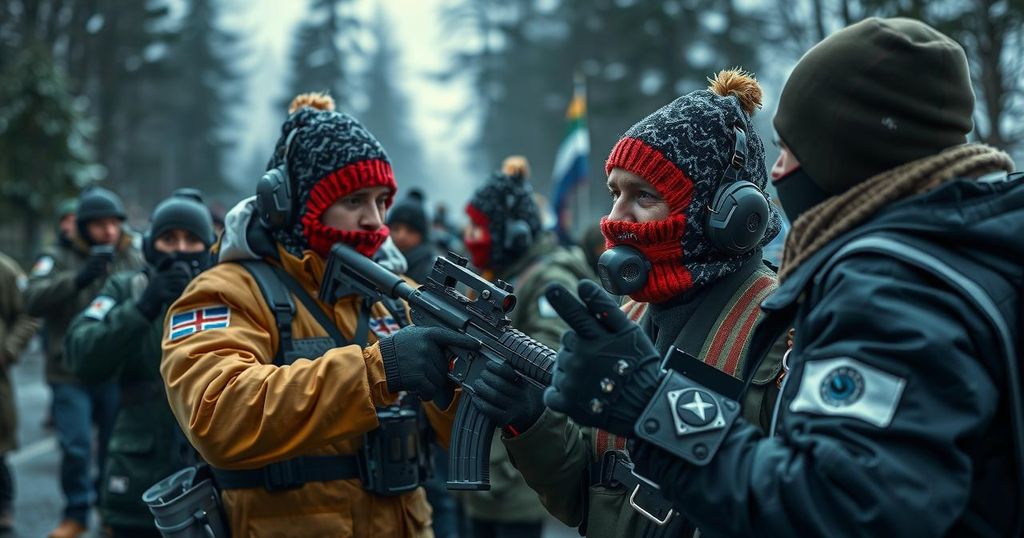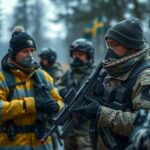Conflicts
Politics
BALTIC SEA, CARL - OSKAR BOHLIN, CRIMEA, DEFENCE, DEFENSE SPENDING, EUROPE, EUROPE/ASIA, FINLAND, GOTLAND, MIC, MIKA, MIKAEL FRISELL, MILITARY, MILITARY SUPPORT, MSB, NATO, NORTH AMERICA, OSKAR BOHLIN, PSYCHOLOGICAL DEFENCE AGENCY, RUSSIA, STOCKHOLM, SWEDEN, SWEDISH CIVIL CONTINGENCIES AGENCY, U. S, UKRAINE, UNITED STATES, WAR
Dante Raeburn
Sweden and Finland Advocate Citizen Preparedness Amid Rising Security Concerns
Sweden and Finland are urging their citizens to prepare for potential war due to increasing security threats, particularly from Russia’s actions in Ukraine. Both nations are enhancing defense measures and encouraging resilience among their populations through informational booklets and initiatives aimed at raising awareness about emergency preparedness.
In light of ongoing global tensions, particularly related to the Russia-Ukraine conflict, Sweden and Finland have taken significant steps to prepare their citizens for potential military confrontations. The two nations, which have traditionally upheld policies of military non-alignment, are now advocating for heightened readiness among their populations. Sweden’s Civil Contingencies Agency (MSB) is prominently distributing a comprehensive 32-page booklet, titled “If Crisis or War Comes,” urging households to prepare for various crises, including war, natural disasters, and cyberattacks. Simultaneously, Finland has initiated a website aimed at enhancing public awareness regarding preparedness for potential emergencies.
The shift in military strategy from both countries stems from heightened security concerns following Russia’s aggression in Ukraine. Swedish officials emphasize the seriousness of the current security landscape. They stress the importance of resilience and preparedness, reflected in their recent pamphlet distribution that emphasizes readiness for worst-case scenarios, such as an armed attack on Sweden.
This renewed focus on civil defense marks a significant change for Sweden, which had notably reduced its military expenditures following the Cold War era. Sweden has taken measures including reinstating limited conscription, enhancing defense budgets, upgrading bomb shelters, and addressing infrastructure vulnerabilities. In Finland, authorities are bolstering efforts with a fortified border infrastructure and the anticipation of a more militarized response to potential threats from Russia.
The 32-page booklet being issued warns citizens to stockpile essential supplies and cultivate home gardens. This actionable intelligence aims to equip the populace with knowledge vital in times of crisis. Finland’s parallel initiatives include the construction of a 200-kilometre border fence, underscoring its commitment to national security in light of shared borders with Russia.
Both nations illustrate a paradigm shift in public safety and military preparedness, indicative of modern geopolitical dynamics. As military threat levels continue to rise, the proactive measures being taken not only prepare citizens for various crises but also signal a commitment to national defense in an increasingly uncertain world.
The article reflects the growing acknowledgment in Sweden and Finland of the changing security environment in Europe due to aggressions like the Russia-Ukraine conflict. Historically known for their military non-alignment, both nations are pivoting towards preparedness as a necessary response to current geopolitical developments. This shift illustrates a broader trend among nations reevaluating their defense strategies in anticipation of potential armed confrontations. With defense measures that were previously dismantled being reinstated, citizens are now being equipped with knowledge and strategies to respond to crises effectively.
In conclusion, Sweden and Finland are urging their citizens to enhance their preparedness for potential armed conflicts amidst a precarious security situation in Europe. Their proactive measures signify a significant shift from a historical stance of military non-alignment to one that prioritizes national defense. As both nations disseminate critical information and bolster defense capabilities, they highlight the importance of resilience and readiness within their populations to face emerging threats.
Original Source: www.dailysabah.com








Post Comment